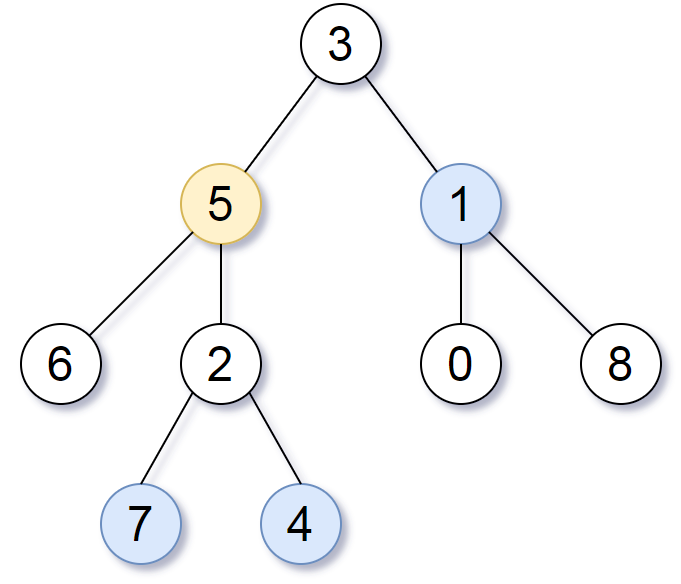Problem description:
We are given a binary tree (with root node root), a target node, and an integer value K.
Return a list of the values of all nodes that have a distance K from the target node. The answer can be returned in any order.
Example 1:
1
2
3
4
5
6
7
8
9
10
| Input:root = [3,5,1,6,2,0,8,null,null,7,4], target = 5, K = 2
Output:[7,4,1]
Explanation:
The nodes that are a distance 2 from the target node (with value 5)
have values 7, 4, and 1.
Note that the inputs "root" and "target" are actually TreeNodes.
The descriptions of the inputs above are just serializations of these objects.
|

Note:
- The given tree is non-empty.
- Each node in the tree has unique values
0 <= node.val <= 500.
- The
target node is a node in the tree.
0 <= K <= 1000.
Solution:
We don’t know the relation from target to node on top of it or on the other side of tree. So we construct a new graph from tree.
- DFS, Build graph that each node knows its parent and child
- BFS, find level by level
1
2
3
4
5
6
7
8
9
10
11
12
13
14
15
16
17
18
19
20
21
22
23
24
25
26
27
28
29
30
31
32
33
34
35
36
37
38
39
40
|
class Solution:
def distanceK(self, root: TreeNode, target: TreeNode, K: int) -> List[int]:
graph = defaultdict(list)
def buildGraph(parent, child):
if not child:
return
if parent: graph[child].append(parent)
if child.left:
graph[child].append(child.left)
buildGraph(child, child.left)
if child.right:
graph[child].append(child.right)
buildGraph(child, child.right)
buildGraph(None, root)
res, queue, visited = [], deque(), set()
queue.append((target, 0))
while queue:
node, dis = queue.popleft()
if node in visited:
continue
visited.add(node)
if dis == K:
res.append(node.val)
elif dis < K:
for neighbor in graph[node]:
queue.append((neighbor, dis+1))
return res
|
time complexity: $O()$
space complexity: $O()$
reference:
related problem:
